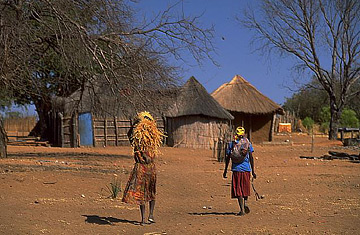
Women walk towards their homes in a Botswana village.
By my count, we've mourned Obed Ramotswe 12 times this morning, and I'm not the only one feeling slightly overcome. His daughter, Precious, has cried her way through 12 renditions of the Botswanan funeral spiritual "Your Yoke Is Light to Carry," and when I approach her, she tearfully waves me away, saying: "I have to stay where I am." Several members of the congregation also look like they can't go on. Even the Western PR executive next to me, a veteran of hundreds of scenes like this, tells me she's finding the whole thing "really quite moving."
It's Day 30 on the 50-day shoot of the No. 1 Ladies Detective Agency, based on the best-selling novel series by Alexander McCall Smith. One of the watchwords of the production is authenticity, which has led director Anthony Minghella to shoot the film in Botswana — a first for this tiny southern African nation — and to involve its people as much as possible. Today's scene is the culmination of months of talks with the villagers of Gabane, 15km (10 miles) outside the capital, Gaborone. First they had to be asked for permission for a film to be made on their land. Then they needed to be told that the particular scene Minghella wanted to shoot there was a funeral. And then, of course, they had to be persuaded to show up as extras.
The negotiations were handled by Bakang "B.K." Bala, a molecular biologist and sometime safari guide who is acting as cultural advisor to Minghella. According to the traditional Botswana khotla system, he made a presentation to the village chiefs, then withdrew, for several weeks, while the chiefs chewed over the matter with their constituents. "They didn't think we were serious at first," he says. "They were asking 'Why would you film a funeral? What sort of film are you making?' Some older people were saying it was bad luck, that if we filmed a funeral, then the village would certainly experience a real funeral within a few days."
But the khotla was eventually swayed, and the villagers, unable to tolerate the crew's lame attempts at constructing a circle of mud huts, even built the set. On the day of the shoot, hundreds have come to "mourn" at the funeral of the father of the central character, Precious Ramotswe, played faultlessly by R&B singer Jill Scott.
And it is the intensity of the extras' performance that starts the trouble. Minghella calls "action" and the villagers begin singing Joko Ya Hao e Bobebe. The first verse translates as: "Your yoke is light to carry. It soothes my heart. Faith is my shield that will protect me from death. I find happiness in Your way, my Lord. All my enemies have run away. You have defended me." The harmony is searing, deep and silencing. And like a Pavlovian experiment, it has a spectacular and irresistible ability to crumple stern brows and send tears tumbling down cheeks. Around the set, stubbly grips and butch riggers snap on sunglasses. We journalists try not to look each other in the eye. The cast, seasoned professionals, use it for motivation and spend the day blubbing like children. We all know there is a reason why the mourning is so practiced. Botswana has one of the highest HIV/AIDS rates in the world.
I ask B.K. if it's always like this at a Botswanan funeral. "It is," he replies brightly. "It was very important for us for the village to be a part of this film. We told them it was a funeral and asked them to bring Botswana to the movie. So they are being moving and spiritual. It has that impact, yes. You respond that way."
Minghella does his 12 takes and calls lunch. When the actors and crew assemble again for the afternoon, I decline an offer to accompany them and slink off to a trailer. I can't take any another trip through this emotional wringer. I need to cheer up. Thankfully, next week's assignment is Somalia.
